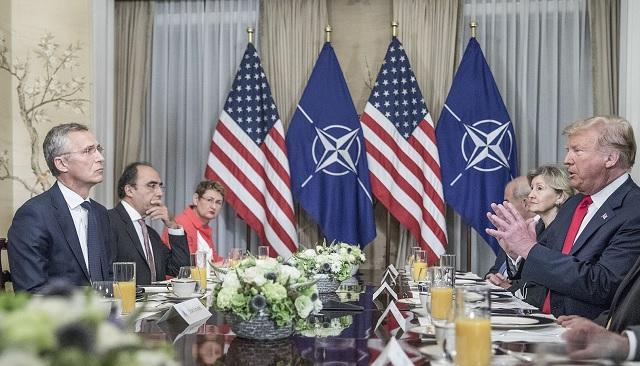After the bombast, NATO’s still here
Posted By Jacqueline Westermann on July 13, 2018 @ 16:37

Looking past the drama that surrounds any Donald Trump visit, it appears that NATO has emerged from its two-day summit in Brussels as strong as ever.
The 28 allies, including the US, agreed on a long and detailed communiqué [1] that criticises—in unprecedented depth—Russian aggression and its breaching of ‘the values, principles and commitments which underpin the NATO–Russia relationship’.
The allies have reiterated their commitment to fight international terrorism and to support international treaties and initiatives for non-proliferation and to combat the use of chemical weapons.
They’ve reaffirmed their commitment to Afghanistan and promised support through 2024. The allies also launched a new capacity-building initiative in Iraq as well as a ‘Package on the South’ dealing with threats on Europe’s southern periphery and bringing stronger cooperation on the Middle East and Africa. NATO’s Regional Hub for the South in Naples is now at full capacity.
In the lead-up to the summit, much was written [2] on likely outcomes. America’s allies prepared for the worst. In Brussels, media coverage quickly focused on Trump’s attacks on Germany, including his claims that it spent too little of its GDP on defence and that Germany was ‘captive’ [3] to Russia because that’s where 60 to 70% of its ‘energy’ came from. In reality, 50% to 75% of Germany’s natural-gas imports come from Russia, and gas makes up less than 20% [4] of Germany’s overall energy mix.
Germany’s foreign office quickly pointed out via Twitter [5] that in 2017, gas imported from Russia made up only 9.6% of Germany’s total energy consumption. When oil from Russia was added, the total Russian share of Germany’s energy consumption was still only 23%—far from the 70% Trump claimed.
On the US president’s claim that Germany was ‘captive’ to Russia, an unhappy German Chancellor Merkel countered with recollections of her own experience of living in Soviet-controlled East Germany. Later that day, Trump suggested [6] that allies should spend 4% rather than 2% of its GDP on defence, a number that seems utopian [7]. Not even a third of the allies have reached the 2%-goal, and the US spends about 3.5% of its own GDP on defence.
If the allies thought those tirades on the first day were all they had to deal with, the second day provided greater drama. The Trump administration cancelled bilateral meetings with NATO allies and partner countries. Then Trump arrived late to scheduled talks with the Georgian and Ukrainian governments and diverted the agenda to defence spending. Reuters reported that the president told the stunned group that the US ‘would have to look to go its own way’ [8] if allies didn’t raise their defence spending to 2% by January 2019 instead of by the 2024 target.
Trump left in his wake concerns that he not only enjoys the uncertainty he creates but also that he has no understanding of why alliances exist and how they work.
Notwithstanding all this drama, other key achievements at the summit were the launch of the NATO Readiness Initiative, significant progress on a NATO Joint Intelligence and Security Division led by an assistant secretary-general for intelligence and security, and a joint air power strategy [9]. The communiqué noted that members of the alliance have been increasingly challenged by hybrid warfare, and such activity can now be declared an attack invoking Article 5 and committing the allies to common defence.
With that comes the establishment of ‘counter hybrid support teams’, and the decision to establish a cyberspace operations centre in Belgium; a Joint Force Command in Norfolk, Virginia; and a Joint Support and Enabling Command in Germany. The Multinational Division North East HQ will achieve full capability by December 2018, and will see the establishment of a Divisional HQ Baltic Command to focus on security in the Baltic Sea region [10].
The communiqué underlines the alliance’s commitment to its partners in North Africa, the Middle East and the Gulf region. As expected, Macedonia was offered membership during the Brussels summit, and the door was left open to discussion on the admission of Bosnia and Herzegovina, Georgia, and Ukraine.
The allies also emphasised the successful and deepening partnership with the European Union, and highlighted NATO’s leadership role in advancing the women, peace and security agenda through a renewed WPS policy and action plan.
The implementation of many themes, however, remains on the to-do list, including improving military mobility by land, air and sea by no later than 2024 and developing a NATO space policy. Some allies, with Macedonia, signed a memorandum of understanding [11] to jointly acquire and warehouse land-battle munitions to foster interoperability and effectiveness.
At the summit, the alliance demonstrated that it is vital and committed to ensuring the security of its members. The strong communiqué was agreed upon by all and not cancelled by Trump (yet).
Outside NATO, analysts have been driving a discussion on whether defence expenditure as a proportion of GDP is the most appropriate way to measure contributions to the alliance or whether other factors [12]—such as troop contributions or burden-sharing in general security challenges through capacity-building, conflict prevention or stability missions—would be a better measure.
This crucial question doesn’t seem to have been part of official NATO discussions. Perhaps it could be considered next year, when the NATO members are scheduled to meet to review the process and celebrate 70 years of the alliance.
Article printed from The Strategist: https://aspistrategist.ru
URL to article: /after-the-bombast-natos-still-here/
URLs in this post:
[1] communiqué: https://www.nato.int/cps/en/natohq/official_texts_156624.htm
[2] much was written: /transatlantic-relations-and-the-upcoming-nato-summit/
[3] ‘captive’: https://www.afr.com/news/politics/world/donald-trump-says-germany-a-captive-of-russia-20180711-h12kgl
[4] than 20%: https://www.bbc.com/news/business-44794688
[5] via Twitter: https://twitter.com/GermanyDiplo/status/1017421313944645632
[6] suggested: https://www.theguardian.com/world/2018/jul/11/donald-trump-tells-nato-allies-to-spend-4-of-gdp-on-defence
[7] utopian: https://twitter.com/Ce_Moll/status/1017377310662590467
[8] ‘would have to look to go its own way’: https://www.reuters.com/article/us-nato-summit/trump-claims-nato-victory-after-go-it-alone-ultimatum-idUSKBN1K135H
[9] a joint air power strategy: https://www.nato.int/cps/en/natohq/news_156372.htm
[10] security in the Baltic Sea region: https://www.defensenews.com/smr/nato-priorities/2018/07/11/nato-has-a-new-baltic-command-structure/
[11] memorandum of understanding: https://www.nato.int/cps/en/natohq/news_156841.htm
[12] other factors: https://warontherocks.com/2018/07/redefining-nato-security-investment-moving-beyond-2-percent/
Click here to print.